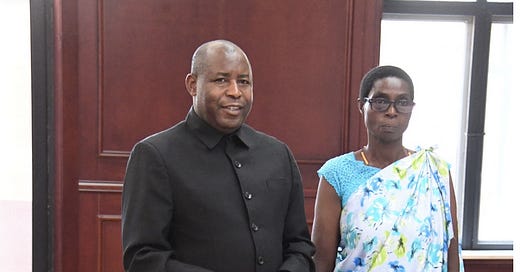The International Rural Women's Day, 2020 edition
RegionWeek Newsletter Vol III, Issue #132 | Thursday, October 15, 2020

Image: President Evariste Ndayishimiye received this, Thursday, October 1 5, 2020 at the Presidential Palace Kwa Ntare, Mrs. Rose Sindayihebura, a rural community role model, as part of the celebration of the International Day of Rural Women.
Dear Readers,
Every year on October 15th, the world celebrates the International Rural Women's Day. The first International Day of Rural Women was observed on 15 October 2008.
This new international day, established by the General Assembly in its resolution 62/136 of 18 December 2007, recognizes “the critical role and contribution of rural women, including indigenous women, in enhancing agricultural and rural development, improving food security and eradicating rural poverty.”
Representing around 55% of the workforce, Burundian women constitute the beating heart of the country's economy, and are particularly active in the agricultural sector, while other sectors, such as construction, remain traditionally reserved for men.
Rural women in Burundi are the backbone of the household and the engine of the economy"Women living in rural areas face many difficulties. Their opportunities for education and work are limited. Disadvantaged compared to men and mainly farmers, they say they lead a self-sustaining life.
The insufficiency of cultivable land, poor living conditions, lack of financial means, the absence of a law for the succession of women are among others the main obstacles facing the rural women encountered.
The role of rural women in Burundi nevertheless remains cruelly underestimated, if not duly ignored to this day: marginalized and stigmatized, they must comply with the decisions of their husbands who alone have the right to manage the money and owning plots of land.
According to Burundian law, women are deprived of the right to inherit. To own a plot of cultivable land, a springboard if there is one towards autonomy, they would therefore be forced to buy it - an extremely rare case, considering the control kept by men over household finances.
Burundi lives essentially on agro-pastoral production, which accounts for more than 50% of the GDP. Statistics have shown that 94.3% of the population depends on subsistence agriculture. The agricultural sector employs around 60% of the working population, of which 77% are women.
The percentage of women active in cultivation and market gardening activities remains high Burundian women are numerous, especially in the agricultural sector where they represent 90% of the workforce.
In general, they work for free on family farms and a minority engages in petty trade in vegetables, fruit, and other foodstuffs. Some have embarked on micro-enterprises in milk, fishmongers, crafts, agribusiness, etc. This shows that the majority of economically active women are engaged in the primary (agriculture) and secondary (crafts) sectors.
Marital authorization, once required for the exercise of a business, is no longer relevant. The obstacles to their presence in the structured employment sectors and at the level of managerial positions lie in the low level of education, the socio-cultural obstacles, and the weak industrialization of Burundi.
Key facts
Rural women - a quarter of the world’s population - work as farmers, wage earners, and entrepreneurs.
Less than 20% of landholders worldwide are women. In rural areas, the gender pay gap is as high as 40%.
Reducing the gap in labor force participation rates between men and women by 25% by the year 2025 could raise global GDP by 3.9%.
If women in rural areas had the same access to agricultural assets, education, and markets as men, agricultural production could be increased, and the number of hungry people reduced by 100-150 million.
“Together, we must invest in rural women so that they have access to the healthcare, social protection, and agricultural information services they need. We must close the digital divide and provide essential services to respond to the shadow pandemic of violence against women. And we must tackle the discriminatory land and inheritance laws and practices that make rural women vulnerable to losing their sources of income.” - Antonio Guteres, UN S-G
In his message, the UN Secretary-General emphasized that everyone should renew commitment to rural women in all their diversity; and increase efforts to support them through the COVID-19 pandemic, and work with them to build their resilience to future crises.
Thanks for reading
Fabrice Iranzi, RegionWeek.com
Support RegionWeek Newsletter!
Contribute at least $5/Month, and join our amazing community of supporters!
RegionWeek is a Burundi-based media for a new generation of achievers in Africa, a platform devoted to chronicling the journey to Freedom and Empowerment.



